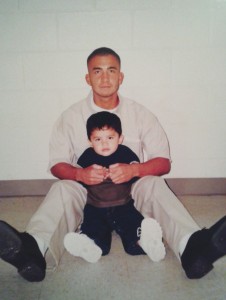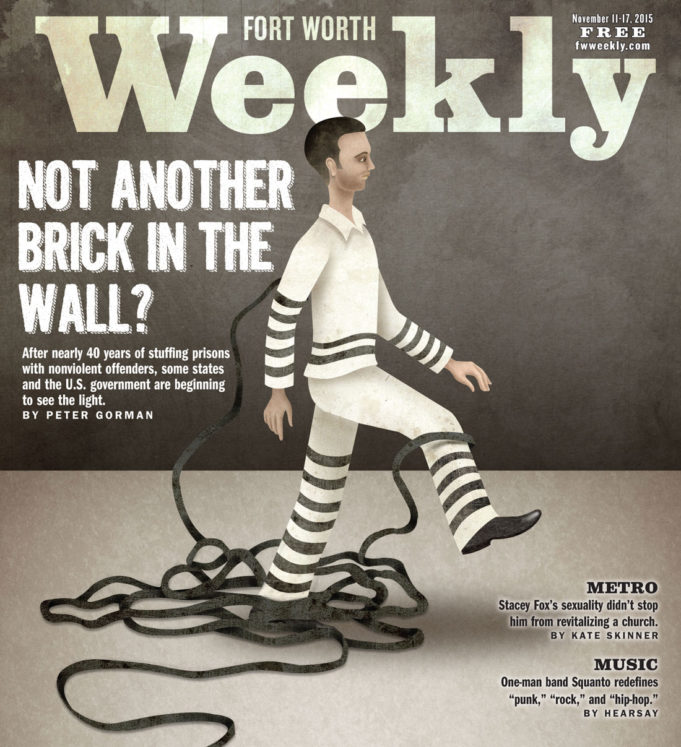Jason Hernandez began selling marijuana in his McKinney neighborhood in 1992, when he was 15. At first, it was baggies, but within a couple of years he moved up to moving pounds. From there he moved on to selling crack cocaine, and by his own admission he was good at it.
“It’s what I did,” he said. “It’s what everyone in my neighborhood did at that time.”
And everything was working nicely for him until March 16, 1998, just about a month after his 21st birthday. That’s when the police came and arrested him. His crime? Conspiracy to distribute crack cocaine and methamphetamine, along with several other conspiracy charges.
But there wasn’t a speck of cocaine, crack, methamphetamine, or any other illegal drug on Hernandez, who thought it odd that the cops simply patted him down and didn’t search his place or car. “I didn’t have anything, but it turned out I wasn’t really the one they were after.”
Other dealers in the neighborhood had been picked up by the police, and when asked who their supplier was, many named Hernandez.
The feds took the case, and he was offered eight years if he would testify against another dealer. He wouldn’t. He went to trial, and a dozen people testified against him.

“I’m not going to deny what I did,” he told the Fort Worth Weekly. “I did sell drugs, but they didn’t catch me with any. It was a dry conspiracy.”
His sentence as a first-time offender convicted of a conspiracy in which no drugs were found? Life without parole. Plus 20 years. And another 20. And another 20. And another 20. And then 40 more years, and 40 more, and then 60 years on top of that, all to be served consecutively. And then eight years of parole and a $6,000 fine, just in case he outlived life without parole and the additional 200 years.
Hernandez’ case is not unique, though the sentence was unusually harsh. Hundreds of people around the country are serving life-without parole for first-time nonviolent drug offenses. Some are serving in state penitentiaries, some in the Federal Bureau of Prisons. Hundreds of thousands of other offenders are serving lesser but still harsh sentences for nonviolent drug offenses.

How such harsh drug sentencing came about is a mosaic of fear mongering, political expediency, and the tenor of the times. Its roots run deep, from the first anti-opium laws, aimed at the Chinese population in San Francisco near the end of the 19th century, through newspaper publisher William Randolph Hurst’s relentless war on marijuana that culminated in its being made illegal in 1937. President Richard Nixon declared a war on all illegal drugs in 1971 and then created the Drug Enforcement Administration to fight that war. That same year, New York Governor Nelson Rockefeller signed into law the harshest drug sentences in the United States. Politicians began outdoing one another to appear tough on drug crime. Add to that the federal mandatory minimum sentencing for drug crimes that was put in place in the 1980s, and several states’ Three-Strikes-You’re-Out laws in the 1900s, and the elimination of federal parole, and by the turn of the century, the United States had become incarceration nation.
Despite having both the highest percentage of its population behind bars and the highest total number of people in the criminal justice system, crime in the United States didn’t slow down at all. The harsh sentences didn’t appear to be a deterrent to drug crimes. The loss of early release on the federal level and the removal of safety nets once prisoners were released — including a ban on food stamps and the use of federally subsidized housing for felons — only caused recidivism rates to rise, which in turn led to prison over-crowding. The vast amounts of public monies being spent on keeping prisoners in prison were cut back on the rehabilitation end of the criminal justice system: In many prisons, libraries, GED classes, job training, and drug and alcohol therapy were frequently eviscerated or eliminated. Prisoners were being released with fewer and fewer options with which to successfully reintegrate to society.
It all came to a head in 2007 in Texas, when the state was faced with either building new prisons or finding out some other way to handle criminal justice. Surprisingly, Texas politicians said no to new prisons and embarked on changing their approach to incarceration. Other states and the feds took notice. In 2014, changes in federal sentencing laws allowed some drug felons to get out a couple of years early. In 2013, President Barack Obama stepped into the fray and commuted the sentences of eight drug offenders. And a bipartisan bill that would allow thousands of offenders to avoid prison altogether is expected to become federal law in early 2016.
“Somewhere in all of this, we, as a country, have modified our thinking and approach to criminal imprisonment,” said Mary Price, general counsel for Families Against Mandatory Minimums (FAMM), an organization fighting to eliminate mandatory drug sentencing. “And that’s partly because we’ve learned that public safety is not harmed when we don’t use prisons to address all these issues.”
******













I find it criminal that the justice system thinks it fair to send people who smoke pot to jail,….PERIOD!!!!!!!!!!!!!!!!!!!!!!!!!!!!!!!!!!!!!!!!!!!!!!!!!!!!!!!!!,…did I say PERIOD!!!!!!!!!!!!!!!!!!!!!!!!!!!!!!!!!!!!..
I find it also ignorant as hell these law makers in TEXAS and through out the country don’t apologize to these men who are behind bars for LIFE, for POT!!!!!!!!!!!! I can’t help but ask are you people that damn stupid????????…now as far as other drugs go, lets say heroin, crack cocaine, meth, all these hard drugs only hurt the user, on the most part, and why send them to jail either for LIFE……???????? I sound mad, but no I am just amazed that these buckle draggers are making law that get passed and hurt people who are only hurting themselves…!!!!! I think the tides changing and you people in power are starting to open your ears, get them people out of freakin PRISON!!!!!!!!,…….and NOW!!!!!!!!!!!!
Knuckle Draggers*…
auto spell….
How much pot do you smoke, James?
Treatment programs may help users who want to quit using, but they won’t help dealors quit dealing. Dealers of hard drugs knowingly wreck peoples’ lives and do not deserve sympathy merely because the crime doesn’t involve assaultive behavior. It’s analogous to letting an infant play with a loaded .45. It’s bound to cause harm even if the offense itself is non-violent.
My bird-dog is smarter than you Stouty, whats wrong with you? That’s the question needing an answer here. No one, never, ever, night or day, goes around shooting other folks up with hard drugs, but the topic here is WEED. Baggers & other rats do go around every morning, mid-day, and night, work-days, holidays, rain, shine, or cloudy, shooting other folks stone-dead with that .45 or what-ever hand gun, rifle, or shotgun that they can buy, borrow, steal, or rent…365 days anually, both year-in and year-out. Easter, Christmas, Stock-Show, World Series, Birthdays, ground hog-day, no days off, none. You don’t see many Hippies doing that crazy shit. Stone-headed, butt-wipe, Baggers do not deserve sympathy, nor compassion, however, I offer mine. I’m praying for you. Clean up, wize up and amount to something. Good luck, Peace.
Read the story butthead. Hernandez dealt crack. The article seems to urge empathy for everything from crack dealers to pot smokers. Huge difference there. Stoutie yourself.
While discussing counseling as an alternative to harsher punishment, I wonder: Do you bleeding-heart liberals urge counseling for ISIS terrorists? Or maybe Obama could give a nice speech and ISIS will lay down their arms?
“While discussing counseling as an alternative to harsher punishment….”
It’s clear in the article that the backing of alternatives to prison time is being pushed by both the right and left on the issue. Republican Texas is the state that other states and the federal government are following. And Texas’ Senator John Cornyn wrote much of the bill that’s recently made it out of committee. So I don’t think this is an issue being pushed only by “bleeding-heart liberals”.
Mr. Gorman, you’re spitting into the wind by providing well known facts to a peckerwood, Tea-Bagging, flake. Stouty hasn’t a clue as to whose on first, nor does he care….he’s a Tea-Bagging devotee. See? He’s shooting blanks. Just put him on your Prayer List.